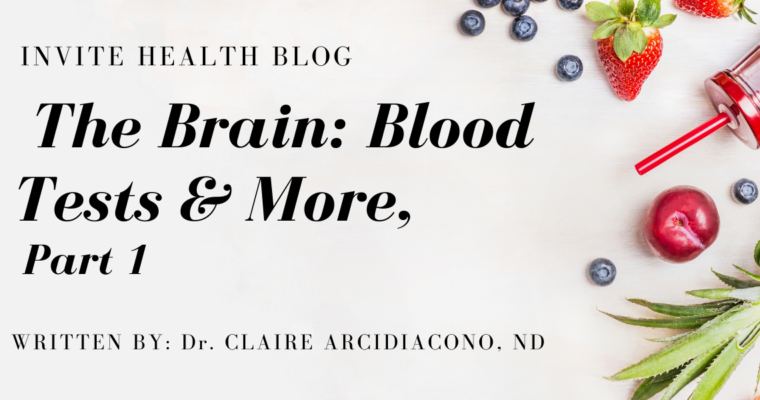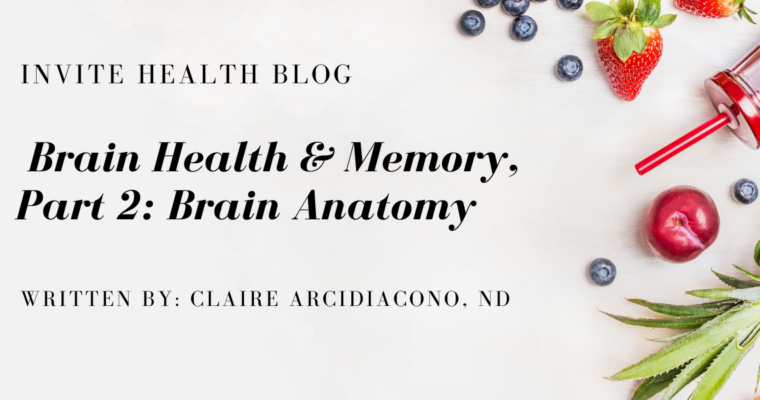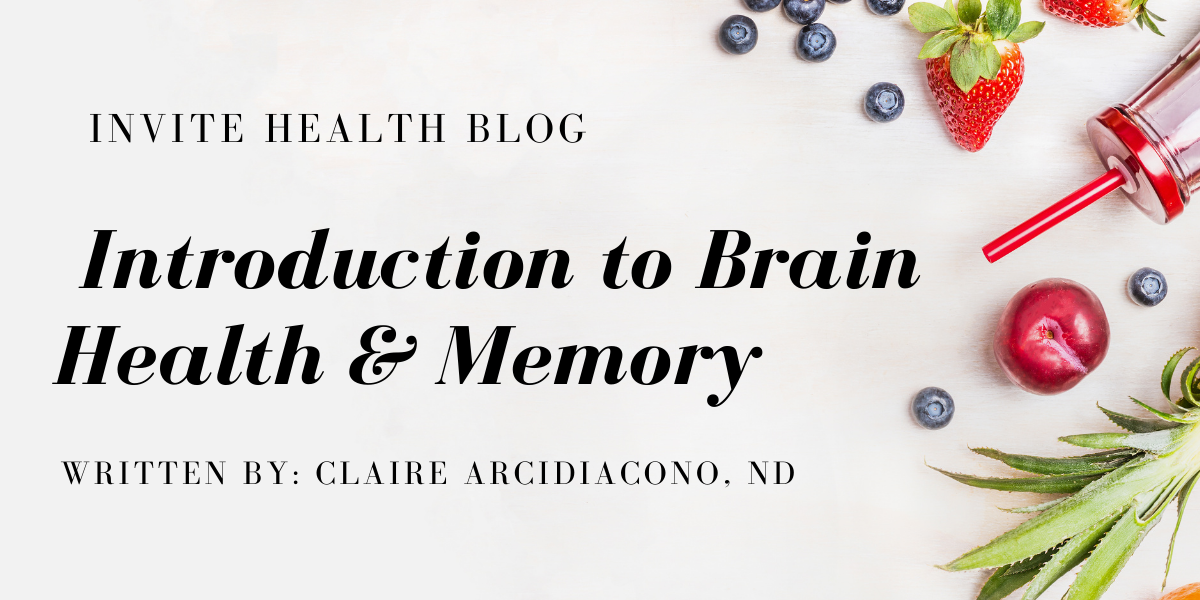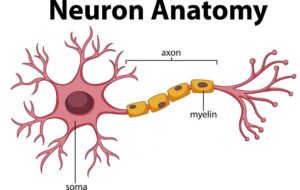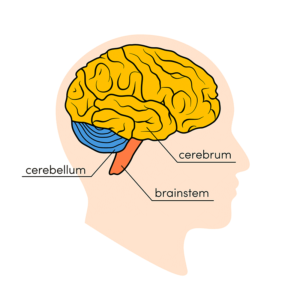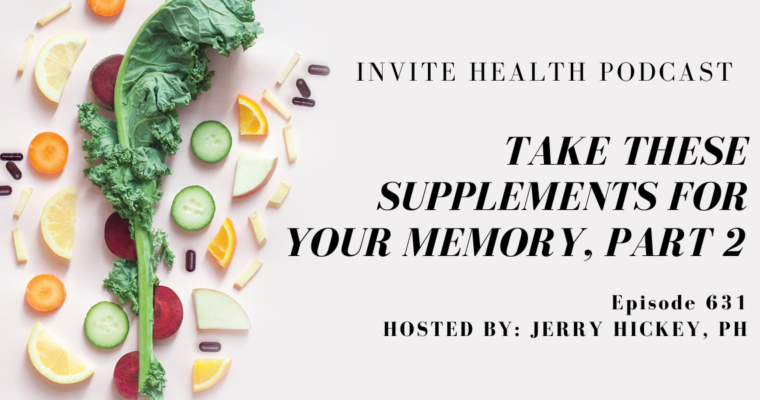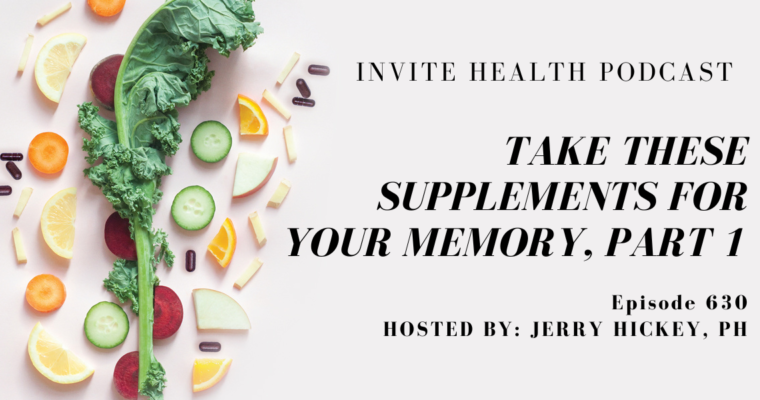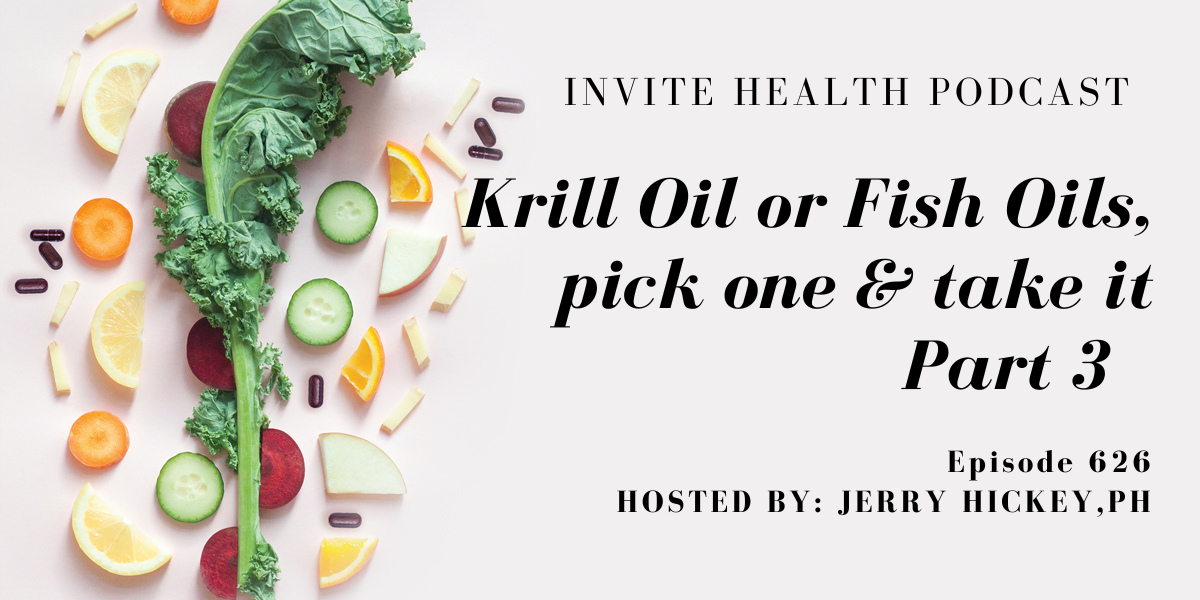Subscribe Today!
Please see below for a complete transcript of this episode.
KRILL OIL, OR FISH OIL. PICK ON AND TAKE IT- PART 3. INVITEⓇ HEALTH PODCAST, EPISODE 626
Hosted by Jerry Hickey, Ph.

*Intro Music*
InViteⓇ Health Podcast Intro: [00:00:04] Welcome to the InViteⓇ Health Podcast, where our degreed health care professionals are excited to offer you the most important health and wellness information you need to make informed choices about your health. You can learn more about the products discussed in each of these episodes and all that Invite Health has to offer, at www.invitehealth.com/podcast. First time customers can use promo code podcast at checkout for an additional 15% off your first purchase. Let’s get started. † [00:00:34]
*Intro Music*
Jerry Hickey, Ph: [00:00:40] Welcome to part three of my podcast episodes. Krill or fish oils, pick one and take it. I’m reviewing different reasons why it is so important. Truly, for your health, the health of your brain and your heart, but also your muscles. I didn’t even go into bone health and many other reasons why it’s important to take one of these supplements just to ensure that you’re getting sufficient levels of the nutrients in fish oils. And the reason I, I opt personally to take Krill oil is there’s additional benefit, the benefits are actually amplified because there’s additional ingredients in the Krill oil versus the fish oils and not to mention there are other significant aspects, significant advantages actually to taking Krill because it’s easier to swallow. You don’t get the fish burps, it’s easier to keep fresh and there’s really a pretty good archive of research. And as new research coming out all the time about the benefits of fish oils and Krill oil. So the name once again is Krill or fish oils, pick one and take it. I prefer Krill oil. My name is Jerry Hickey, I’m a nutritional pharmacist, I’m also the senior scientific officer over here at Invite Health. You can find all of the Invite Health podcasts wherever you listen to podcasts for free that is, and you can also just go to invitehealth.com/podcast and listen to any of these. There’s hundreds of them at this point performed by different health professionals. You can also find Invite at Twitter, Facebook and Instagram at Invite Health. So I really want to get into this because now we’re going to go into studies about the heart and a lot of them will be with fish oils, but Krill will accomplish the same thing. This is the journal Pharmacological Research. So we’re going way down memory lane. This is 1999, September 1999, so we’ve known about these benefits for many decades. And they’re looking at the DHA specifically in fish oils, DHA is one of the major fats in fish oils and krill oil, and it’s very good for the brain. It’s also very good for the heart, it’s good for the eyes, it’s good for your muscles and bones. It’s good for women’s breasts, it’s good for the colon. It’s just fantastic for the liver. It’s looking at fish oils close to 200 milligrams of DHA per day, reduced the risk of dying, the rate of dying, the rate of dying after a heart attack by 50%. And there was a very strong correlation that fish oils in general reduce thrombosis. In other words, because they’re anti-inflammatory, they help prevent improper blood clotting. Now, they’re not really a great blood thinner. In fact, they’re pretty poor blood thinner. So I wouldn’t, I wouldn’t depend on fish oils as a blood thinner, you’re better off with a low dose aspirin. We don’t call them baby aspirins anymore because they can cause damage to children if there are particular viruses, nerve damage. We call them low dose adult aspirin. So you’re better off taking a low dose adult aspirin to help prevent blood clots. But fish oils work in a different way because they’re anti-inflammatory. They’re not directly thinning the blood, they’re just helping prevent thrombosis by reducing the inflammation that might trigger a blood clot that can lead to a stroke or heart attack. And fish oils also, of course, reduce triglycerides and they help prevent cardiac arrhythmias. This is all coming out of that study in 1999. We knew even before that of these benefits, so this is The Lancet. † [00:04:18]
[00:04:19] The Lancet is sort of the British version of the New England Journal of Medicine, and it’s the March 2007 edition. And they said there’s epidemiological and clinical evidence. Epidemiological means they’re looking at large population studies, and clinical evidence means they actually did a study specific to fish oils and they said the increased intake of n-3 long chain fatty acids, now that’s interesting. The terminology for fish oils, there could be n-3 fatty acids, they could be a long chain fatty acid, EPA, DHA, fish oils, there’s all different names. They protect you from mortality related to coronary artery disease. So, I mean, there’s so much evidence. So, this is Kobe University, Kobe University. They tested the long-term effects of EPA and a prevention of major heart related events from our age of coronary events and patients with elevated cholesterol. So, they’re looking at Kobe University, by the way. So, in Japan, they’re looking at 18,645 patients with elevated cholesterol. So, their cholesterol’s typically 251 mg/dl. Another way to say that it would be above 6.5 million moles per liter, there’s different ways of saying these terms, that’s how medicine is. You know, you’re stuck with all these terms and they’re looking at statins versus statins, plus fish oil EPA over a five-year period. So, they looked at sudden cardiac death, they’re looking at cardiac arrest, they’re looking at fatal heart attacks and survivable heart attacks, non-fatal heart attacks. They’re looking at unstable angina, which is very dangerous. That’s when you’re not getting enough blood flow to the heart. They’re looking at the need for heart surgery and stenting or angioplasty or bypass surgery or grafting, and they found that adding the EPA from fish oils onto a statin, reduced the death of fatal heart attacks by 19%. That’s above and beyond any benefit from a drug. And they reduce the risk of sudden cardiac death in patients with coronary artery disease. And I mean, it was reducing LDL cholesterol, a major factor in cardiac events. It was preventing unstable angina; it was preventing nonfatal heart attacks. It was, all of this was reduced in a group that was getting the EPA, which one of the fish oils, one of the oils in fish oils and Krill oil added to a statin. Now, let’s just talk about sudden cardiac death. Sudden cardiac death kills anywhere from 250 to 350,000 Americans each year. What happens? They have cardiac arrest. This happened to that football player on the Buffalo Bills about six weeks ago. And this is what killed Elvis Presley’s daughter. What’s her name? Priscilla Presley. I don’t keep up with that stuff, I’m not big into like you know, celebrities. So, but it killed Elvis Presley’s daughter. And so cardiac arrest is usually a byproduct of having heart disease, something some kind of damage to the heart. But it can also happen from like an accident, like severe trauma to the chest and the heart stops beating. The problem is only about 8% of the people who suffer with this, the heart starts to beat again. So, it kills over a quarter of a million Americans each year. There’s many, many scores of studies that fish oils reduce your risk of sudden cardiac death by a very solid figure. So that alone, never mind the additional benefits for the brain and the eyes and the muscles and the bones, etc. That alone makes it consequential for taking a fish oil supplement. I mean, there’s true benefit there. So, this is the Journal Nutrients. The Journal Nutrients March 2010, it’s the Department of Preventive Cardiology, Ludwig Maximilian University, that’s in Munich, Germany. Never met them, never been to Germany. I always wanted to go there, especially Munich and the Black Forest area. That’s on my kind of bucket list, except I expect to live for many more years. I’ve got a very long time to complete my bucket list, I believe. So, here’s what they state, sudden cardiac death is responsible for 15% of all deaths in Western countries. And that increased intake of the fish oil or the krill oil fats, the EPA, DHA protects us from sudden cardiac death and other major cardiac events, according to an analysis of data by this group. † [00:09:27]
ICYMI:KRILL OIL, OR FISH OILS. PICK ONE AND TAKE IT. INVITE HEALTH PODCAST, EPISODE 624>>LISTEN NOW!
[00:09:29] So this is the British Medical Journal December 2008, and they looked at 12 studies. They did a meta-analysis where they grouped all these studies, so it’s all different researchers and thousands of people. It’s 32,779 patients. Fish oils decreased the risk of sudden cardiac death up to 48% and reduced risk of dying from any cardiac cause up to 31%. So, I mean, listen, we know that aspirins help protect you and there’s evidence that statins help protect you and ACE inhibiting drugs help protect you from all these things. But fish oils really important, and I have to add, at this point, certain things reduce the amount of fish oils in your body. Statin drugs, believe it or not, there are certain nutrients that are important for your brain and your heart. And statin drugs take them out of the body for one reason or another. So one of them would be Ubiquinol, the active form of CoQ10, statin drugs to reduce the amount of ubiquinol in the body, you actually need additional Ubiquinol if you’re on a statin drug because it gives the brain and your eyes and all your high energy organs like your pancreas and your liver and your skin and your kidneys, but especially your heart and your muscles, gives them energy, endurance and stamina. So here you’re taking a drug for the heart and it’s reducing a major nutrient that’s important for the heart called Ubiquinol. So, if you’re on a statin drug, you have to take Ubiquinol. If you’re on statin drug, you have to take lutein, lutein is important for your vision and your brain, your memory. If you’re on a statin drug, you have to take fish oils. Statin drugs, reduce the amount of fish oils in the body. So instead of just taking a regular amount of fish oils, if you’re on a statin drug, you actually need more than the general population would need. There’s something called the omega three index, it’s the amount of fish oils on your red blood cell versus all the other oils. And you want it over 8% because that’s really where you get the heart and brain benefits for fish oils. You can have that test done, it’s a blood test. So, reducing the risk of dying from heart attacks and strokes and arrhythmias and sudden cardiac death and all of these other things, even if you’re on a statin or aspirin or an ACE inhibitor or one of these fancy drugs, you really should be on fish oils. † [00:11:56]
[00:11:58] And like I said, I prefer Krill oil, I take three a day with my breakfast. But I do eat fish, I do eat fish, I eat fish several times a week. So, this is the Mayo Clinic proceedings, I’m kind of a Mayo Clinic kind of guy, you know, you see the kind of the Mayo Clinic in competition with the Cleveland Clinic. And I’ve seen some things out of the Cleveland Clinic that just didn’t sit right with my knowledge set. So, I’ve always kind of been biased towards the stuff that comes out of the Mayo Clinic. I just have more confidence in them than the Cleveland Clinic and what can I tell you? So according to the Mayo Clinic proceedings, December 2019, Fish Oils Reduce Cardiovascular Events. This is the University of Queensland School of Medicine in New Orleans and University of South Dakota School of Medicine and St Luke’s Mid-America Heart Institute. So, fish oils reduce cardiovascular events. What’s a cardiovascular event? Could be sudden cardiac death, it could be a cardiac arrest, which is kind of like a heart seizure. It could be an arrhythmia, like atrial fibrillation when heart’s beating erratically and very rapidly and it could throw off a blood clot that ends you by causing a stroke. It could be a heart attack. I mean, it could be anything, anything with the heart. So, fish oils reduced cardiovascular events. They reviewed three randomized controlled trials, very large trials of fish oils on the occurrence of cardiovascular events, and here’s what they found. One trial had 8179 patients, most with coronary heart disease, which is the biggest killer in the world. The arteries in the heart clogged. The arteries are usually the biggest blood vessels, but the ones in the heart, they’re kind of small, they’re like a sippy straw that you get in a kid’s drink, you know, like the kid’s apple juice, they have that little sippy straw. So, when they get clogged, I mean, it’s very dangerous because there’s not really a lot of room for blood to get to the heart in the first place. You know, even though the heart’s pumping blood, the heart also needs blood. So, the arteries that feed the heart are getting clogged here and high doses of fish oils, especially EPA, reduced risk of major coronary events by 25%. So, the two other large recent randomized controlled trials, 840 mg a day of EPA and DHA, good quality fish oils, significantly, very significantly reduced risk of coronary heart disease, deaths and cardiovascular deaths and events. So, this is especially true in people who don’t consume fish because they’ve got to be very low on fish oils. And how much fish do you need to eat? You need two good servings, like eight ounces of fish twice a week. A lot of people don’t eat fish. I’ll tell you, there’s nothing that tastes better than a freshly caught fish. Like if you’re down in Florida and you could get those, what they call them, mangrove snappers or yellow snappers, I mean, you can’t hurt those fish, they are delicious. So, you know, if you don’t like fish, those are a good fish to look at, they taste delicious. † [00:14:58]
ICYMI: KRILL OIL OR FISH OILS, PICK ONE AND TAKE IT, PART 2. INVITE HEALTH PODCAST, EPISODE 625>>LISTEN NOW!
[00:14:59] So here’s more from the Mayo Clinic proceedings, January 2017. It’s Ann Arbor, Michigan, they’re up at EpiDStat Institute, and they’re looking at 18 randomized controlled human clinical trials and 16 prospective cohort studies. And this is examining fish oils and heart attacks, fish oils and sudden cardiac death, fish oils and anything related to your circulation and death and fish oils related to angina, which is a lack of blood flow to the heart and in patients with elevated triglycerides in these studies in a randomized controlled trials or with high LDL cholesterol. Fish oils really help prevent coronary heart disease risk. They just cut the risk of coronary heart disease and they significantly cut the risk of any coronary heart disease related event. Now, here’s, this really is like the verdict on fish oils. It’s a massive review, an unbelievably comprehensive review that was published recently in the Journal of the American College of Cardiology. It was published on December 28th, 2022, which is very recent. And they looked at all these supplements, all these supplements. You know, people say this is good for the heart and that’s good for the heart, so they said, you know, let’s cut through the nonsense. Let’s see what supplements are really good for the heart, which supplements have really top-notch evidence that they’re good for your heart. They’re important for your heart. So, they collated 884 randomized controlled human clinical trials that were included in their meta-analysis. So, they looked at many more studies on that. So, this combined the results from 883,000 people, I mean, that’s bigger than most cities. Now who performed this? Brown University. Brown University’s Ivy League. Right? And Mt. Sinai Icahn School of Medicine, Mount Sinai is where my doctors are, it’s a great place, Mount Sinai in Manhattan. And they have, you know, Mount Sinai satellites now out in Suffolk County, Long Island, and down in West Palm Beach, Florida. So, you know, you can get to Mount Sinai doctors and they found that fish oils and folate and Ubiquinol are extremely important for your heart. Fish oils, if you had cardiovascular disease, a big killer, fish oils prevented you from dying from cardiovascular disease and they prevented you from dying from a heart attack and they prevented coronary heart disease related events. I mean, this is real data, they were preventing you from having a heart attack or a stroke or arrhythmias or dying from these things. Now, there’s many studies, many additional studies besides what they include in their review that show this. So fish oils, I’m going to rest my case there. I’ve got so many other studies. I’ve got so many other studies. In fact, very quickly, I’ll review a couple of more studies, but let’s just look at the other two supplements very quickly. Fish oils, I use Krill, very good for the heart. Ubiquinol, active version of Coenzyme Q10, very good for the heart. Your heart has a great demand for energy. It’s beating basically 80 times per minute, so that’s over 100,000 times a day. It’s pumping blood, so it never gets a rest, it needs a lot of energy. Ubiquinol is a source of energy, ubiquinol allows the heart to use sugar for energy so, and Ubiquinol levels drop with age. And if you’re on a statin drug, that further lowers your Ubiquinol level. And if you’re diabetic, you can’t create Ubiquinol out of CoQ10, Ubiquinol is the accurate version of CoQ10. So not only are fish oils or Krill oil important for the heart, Ubiquinol is important for the heart and so is folate, folate is a B vitamin in most multivitamins and b-complex, is they use a synthetic form called folic acid. The problem with that is not everybody can convert it into the active form, which is methyltetrahydrafolate. So, if you get a b-complex or you get a multivitamin, make sure the form of folate in there is methyltetrahydrafolate. It’s very important for reducing your risk of stroke and also reducing your risk of Alzheimer’s disease. I promised you several more quick studies on fish oil. So, let’s get to that, now we’re looking at like Alzheimer’s and vascular dementia and Parkinson’s dementia, that’s a new study. But many other studies really support these findings. So, it’s not the study is not existing in a vacuum and its results are supported by other studies. Fish oils reduce the risk of instant dementia. So, it’s reducing the number of people that are diagnosed with vascular dementia or frontotemporal dementia. It’s not the one that Bruce Willis was just diagnosed with frontotemporal dementia. It’s in the journal Frontiers in Neuroscience, and they’re looking at 219,000 people over the age of 60 in the UK, and they followed them for approximately 12 years. I mean, fish oils reduced the risk of vascular dementia by 57%. Vascular dementia is a dementia in and of itself, but it’s also part and parcel of other dementias. So, here’s a meta-analysis from 2016. A meta-analysis means they took a whole bunch of studies and put them together. So, they have to make sure that these studies are well performed, and they are lacking bias and they report it properly. And the beauty of a meta-analysis, you’re taking all of these academic research institutions and you’re clustering together, you’re collating it together. So, you’re getting all different researchers and all different types of people. So, it’s 21 cohort studies, approximately a little over 181,000 people. Fish oils prevented cognitive impairment in people as they age. And fish oils prevented incident dementia, Alzheimer’s disease, Parkinson’s disease, so they were good for depression. They clip your mood ups of several points. So, you know, you really need to pick one and take it even if you’re eating fish several times a week. A lot of things lower the amount of fish oils in your body, and you want a good amount fish oils in your body like statin drugs, lower the amount of fish oils and aging lowers the amount of fish oils in the body for some crazy reason. So, you want to make sure you have enough, and by taking a fish oil supplement every day or a Krill oil supplement every day, it’s further insurance that you have enough fish oils. So, thanks for listening to my podcast episode. You can find all of our podcast episodes for free wherever you listen to podcast or just go to invitehealth.com/podcast. And if you could leave a review and also, you know, sign up, subscribe please, and it’ll be very helpful. You can also find Invite on Twitter, Instagram and Facebook at Invite Health. I want to thank you for listening today and I hope to see you next time on another episode of InViteⓇ Health Podcast. Jerry Hickey signing off, have a great day. † [00:14:59]
*Exit Music*


